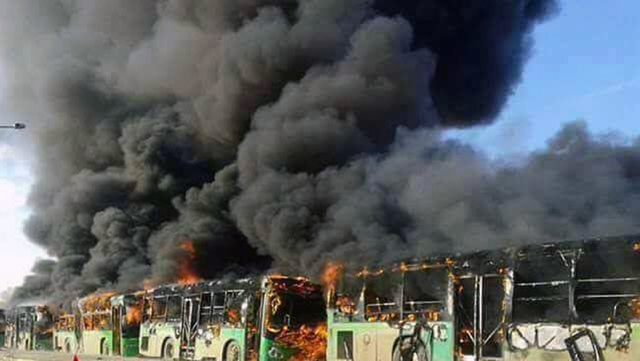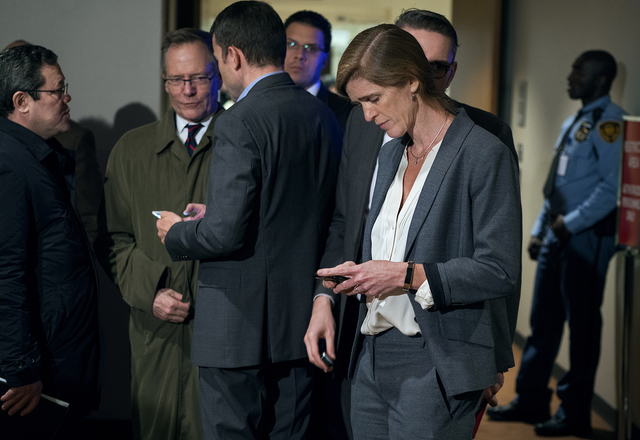CAIRO — Some 400 people from eastern Aleppo arrived outside the city late on Sunday, as evacuations resumed at night despite an attack on buses waiting to carry out a parallel evacuation from government-held villages besieged by rebels. ADVERTISING CAIRO
CAIRO — Some 400 people from eastern Aleppo arrived outside the city late on Sunday, as evacuations resumed at night despite an attack on buses waiting to carry out a parallel evacuation from government-held villages besieged by rebels.
Residents of the devastated rebel Aleppo enclave had waited from the early morning in near-freezing temperatures for places on the buses to the rebel-held countryside, activists said.
The evacuations, halted on Friday, were due to resume after a deal was struck that would also see injured people and families evacuated from the besieged government-held Shiite villages of Foua and Kefraya to the southwest.
Forces on the government side had apparently insisted on the quid pro quo before allowing anyone more to leave under the deal that Russia and Turkey had brokered to evacuate eastern Aleppo after its rebel defenders were driven back to a last small area.
A convoy of government buses duly made its way into the enclave around midday and hundreds boarded, but this time it seemed to be the turn of opposition hardliners to sabotage the deal.
Videos widely shared on social media showed a line of buses in flames.
The Syrian Observatory for Human Rights, a monitoring group, said six vehicles from the convoy to Foua had been destroyed, pointing the finger at supporters of al Qaeda-linked rebel group the Fath al-Sham Front.
A bus driver was killed in the attack, with the buses also coming under shelling, the head of the Aleppo public transport board said.
The “cowardly terrorist attack on civilian buses and killing (of a) driver must not end evacuations,” senior U.N. envoy Jan Egeland wrote on Twitter.
A Syrian military official said on Sunday evening that the evacuation of eastern Aleppo residents and rebel fighters had been suspended until the situation with Foua and Kefraya could be resolved.
Activists inside the besieged Aleppo enclave said they had received messages from evacuees on buses that left in the early afternoon, saying they were trapped in a regime-held area in the south of the city without food or water as temperatures dropped to freezing.
“We are trapped inside the buses since 1:30 pm and we don’t know what is happening,” one east Aleppo activist wrote on Twitter.
The burning of the buses heading for Kefraya and Foua drew a furious reaction from Syrian opposition activists.
Eastern Aleppo “is a besieged area without any means of heating. There are children there and we’re afraid they’ll die of cold,” prominent media activist Hadi Abdullah said in a Facebook video.
“There are families waiting since the morning … By burning the convoy to Foua and Kefraya you’re burning the convoy to Aleppo,” he charged.
But late on Sunday night, something shifted. Five buses carrying some 400 people finally arrived safely in the Rashidin area west of the city, Turkish charity IHH, which is assisting with relief efforts for the evacuees, reported.
Activists in touch with those on board also confirmed that they had arrived safely.
Some 5,500 civilians and 3,000 fighters had already left the enclave under the deal before it broke down on Friday, according to the Observatory.
Many of eastern Aleppo’s remaining civilians and fighters say they fear torture or death if they fall into government hands.
Ahead of their turn to evacuate, activists said many were waiting in the open as temperatures dropped below zero. One activist shared photographs showing people huddling around fires made from abandoned furniture.
Sunday’s shaky restart to the evacuations came as the U.N. Security Council postponed a vote on the deployment of observers to Aleppo until Monday.
The council made the decision after Russia, a key backer of the Syrian government and one of the five countries with veto power on the council, opposed the French-drafted measure.
“We cannot support it. We cannot allow it to pass because this is a disaster,” Vitaly Churkin, Russian ambassador to the U.N., said ahead of a three-hour closed-door meeting Sunday.
Churkin said his country had no problem with observers, but said they must be better trained and the procedure for deploying them better organized.
Russia submitted its own resolution on Syria, several U.N. diplomats said after the meeting ended, and a joint text was being worked on “constructively.”




